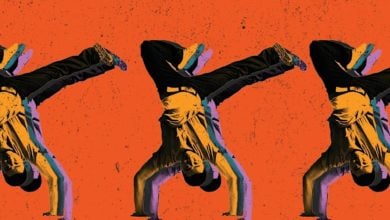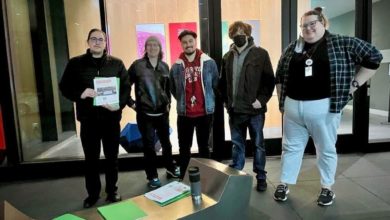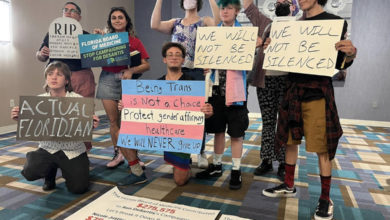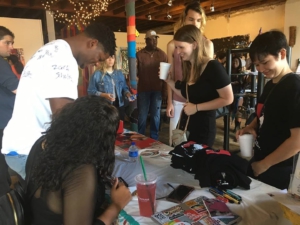
Three days before Juneteenth, dozens of Tallahassee community members strolled through the open doors of The Plant, greeted by the sights and sounds of Black excellence. Artwork adorned the walls from corner to corner. Some vendors had set up tables boasting stickers, zines, and CDs. Elton Burgest, local artist and Juneteenth event organizer, greeted guests with a welcoming smile and genuine gratitude, offering them free stickers promoting his clothing brand, Art Club Clothing.
“I wanted to showcase this day in the same way as the Fourth of July,” said Burgest about his motivation for planning the event. “I wanted to celebrate Juneteenth because on the Fourth of July, there were still slaves working on that day [in 1776], when Americans were ‘freed’.”
Juneteenth commemorates June 19, 1865, the day in which the abolition of slavery was announced in Texas. The whitewashed U.S. education system preaches the historic importance of the Emancipation Proclamation of 1862 as the document that secured the abolition of slavery; however, this revisionist claim ignores that the Proclamation did not, in practice, free a single slave. On June 18, 1865, following the surrender of the Confederate army, Union troops occupied Galveston Island, TX. The following day, General Gordon Granger read aloud General Order No. 3, which ordered immediate emancipation. The formerly enslaved Black Texans rejoiced in the streets, and the following year organized the first of what became the annual Juneteenth celebration.

Several artists were exhibited throughout the event, including painters, musicians, and poets. Many of the works of art celebrated Blackness in some form. Visual artist, FAMU graduate and College Ink’d manager Ceej the Artist’s enormous “The Thinker” portrayed a pensive Malcolm X, complimenting the anti-capitalist character of The Plant itself. Rapper and FAMU student Riot paid homage to TLC with his version of “No Scrubs”, before performing some of his original songs, accompanied by a DJ-ing DREAM HEAD.
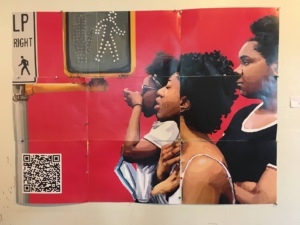
“I like to make art about Black consciousness,” said Burgest. “A lot of my work is about being Black in 2018.” One of his recent works on display at the Juneteenth event was “By Standards,” which depicts three Black women waiting at a crosswalk. Instead of a typical green that connotes “go,” the crosswalk signal is white. As typical of many of Burgest’s works, a QR code in the bottom corner links the viewer to a related article, this one on the Black students of Marjory Stoneman Douglas who felt silenced in the aftermath of the recent shooting. “It’s like no one really cares [until] you place these white kids as the [figureheads of the movement] — and of course, they’re suffering too,” Burgest explained. “It’s just interesting [to think] if it had been an all-Black school, if people would have been as attentive.”
Brian Damage, Chief Operations Officer at The Plant provided context to The Plant’s role as a DIY space in an increasingly gentrified area of Tallahassee. “The mission of the The Plant is to provide an all-inclusive safe space to encourage the individual artist and/or collaboration between artists. As an anti-capitalist space, we are finding our way, slowly watching the surrounding blocks become more gentrified…” he explained. “When areas become more privatized, there’s less space for authentic art to flourish; or simply, when corporations own more land deeds, poor artists are pushed out. The Plant’s building owner is himself an artist, and is committed to maintaining a space where local artists like Burgest, One Will, DREAM HEAD, and so on will be welcomed.”
Creating alternative, anti-capitalist spaces is a necessity for the salvation of the local arts community. Earlier this year, the Florida state government slashed the state’s grant program for arts and culture by nearly 90 percent, from $25 million to $2.6 million. In other words, arts and cultural grants now comprise 0.003 percent of the state’s $88.7 billion budget. Artistry should be recognized and celebrated as the legitimate labor it is.
As we commemorate Black emancipation from slavery in the U.S. we must not ignore the modern day institutions that serve to enslave and exploit Black and Brown people here and abroad. “Juneteenth is an important date for its historical context, but even now over 150 years later, we are still fighting against forced and unpaid labor in the Florida prison system,” said Damage. “The Plant is home to monthly letter-writing dinners and hosts other prisoner solidarity efforts. The transition from plantation slavery in the South to the modern system of prison slavery makes the argument that the enslavement of the poor and people of color didn’t end with the Emancipation Declaration.”

In honor of Juneteenth, we must engage in the modern-day abolition struggle: prison abolition. We must demand the abolition of ICE and immigrant detention centers, which constitute the most profitable sector of the capitalist prison-industrial complex. We must demand the disarmament and dismantling of the U.S. military and the imperial forces that continue to bomb the civilians of Somalia and Libya. The Black liberation movement is a global struggle; an anti-imperialist struggle; a revolutionary struggle.
Artist Roster & Information
- Elton Burgest
- artclubclothing.com
- @artclubclothing & @eltonburgest on Instagram
- Ceej the Artist
- @ceejsclvtchcreations on Instagram
- [email protected]
- Riot
- soundcloud.com/riot407
- @riot407 on Instagram
- [email protected]
- DREAM HEAD
- soundcloud.com/dreammhead
- @dream_head on Instagram
- One Will
- https://www.youtube.com/channel/UCVV43UChMEQahqtlwm_vHSw
- @one.will on Instagram
- n.Verse
- soundcloud.com/nversatility
- [email protected]
- @n.versesdaworld on Instagram
- Rob Ohtis
- [email protected]
- @rob_ohtis on Instagram
- Richard Lewis
- Wicherdwewus.tumblr.com
- [email protected]
- @acidherswirl
- Anala
- @anala_tefnut on Instagram
- Nyviya
- soundcloud.com/nyviya
- [email protected]
- @nyviya on Instagram
- Alon
- [email protected]
- @alonlamonti on Instagram


